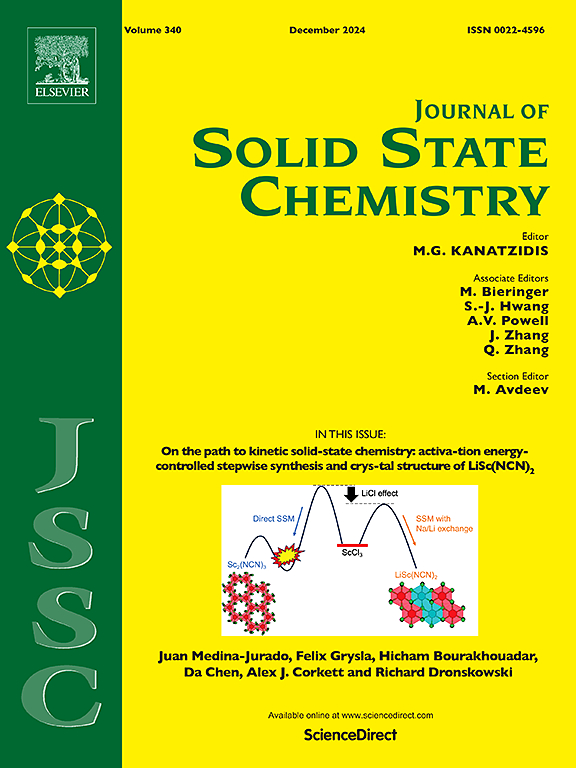Low temperature synthesis and high temperature behavior of feldspar-like CdAl2Si2O8, a promising material for cadmium immobilization
IF 3.2
3区 化学
Q2 CHEMISTRY, INORGANIC & NUCLEAR
引用次数: 0
Abstract
Cadmium is an extremely toxic nonbiodegradable heavy metal, which accumulates in significant quantities in the near-surface environments, where it easily enters surrounding water and soil. In this work, we synthesized a series of cadmium silicates (CdAl2Si2O8, Cd2SiO4, Cd3Si3O9, Cd3(SiO4)O), which are prospective materials for cadmium immobilization. The most environmentally stable and least studied of them, CdAl2Si2O8, was investigated by means of scanning electron microscopy, energy-dispersive X-ray spectroscopy, powder and single crystal X-ray diffraction (over the temperature range of 27–1100 °C). Using alkali cations additives, we were able to obtain CdAl2Si2O8 at a temperature (500 °C) half previously reported. We showed that cadmium can be successfully incorporated into a feldspar-like crystal structure and that the amount of cadmium could range depending on synthesis conditions from 21 to 37 wt % CdO. Our data indicate that CdAl2Si2O8 is stable up to at least 1100 °C and does not undergo phase transitions with a change in the volume of the unit cell. We can conclude that CdAl2Si2O8 is a promising material for cadmium immobilization, given its resistance to leaching and low synthesis temperatures.

长石样镉固载材料CdAl2Si2O8的低温合成及高温行为研究
镉是一种剧毒的不可生物降解的重金属,在近地表环境中大量积累,很容易进入周围的水和土壤。本研究合成了一系列的镉硅酸盐(CdAl2Si2O8, Cd2SiO4, Cd3Si3O9, Cd3(SiO4)O),是很有前途的镉固定化材料。利用扫描电子显微镜、能量色散x射线光谱学、粉末和单晶x射线衍射(温度范围为27-1100℃)对CdAl2Si2O8进行了研究。使用碱阳离子添加剂,我们能够在500°C的温度下获得CdAl2Si2O8,这是以前报道的一半。我们发现镉可以成功地结合到长石状晶体结构中,镉的含量可以根据合成条件从21到37 wt % CdO不等。我们的数据表明,CdAl2Si2O8在至少1100°C下是稳定的,并且不会随着单体电池体积的变化而发生相变。我们可以得出结论,CdAl2Si2O8是一种很有前途的镉固定材料,因为它具有抗浸出性和较低的合成温度。
本文章由计算机程序翻译,如有差异,请以英文原文为准。
求助全文
约1分钟内获得全文
求助全文
来源期刊

Journal of Solid State Chemistry
化学-无机化学与核化学
CiteScore
6.00
自引率
9.10%
发文量
848
审稿时长
25 days
期刊介绍:
Covering major developments in the field of solid state chemistry and related areas such as ceramics and amorphous materials, the Journal of Solid State Chemistry features studies of chemical, structural, thermodynamic, electronic, magnetic, and optical properties and processes in solids.
 求助内容:
求助内容: 应助结果提醒方式:
应助结果提醒方式:


